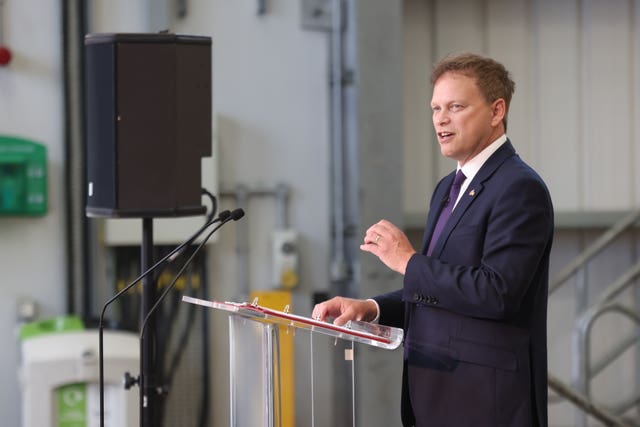
RMT general secretary Mick Lynch has accused Transport Secretary Grant Shapps of “talking nonsense” after the minister published a series of tweets describing “outdated working practices” in the railway industry.
Mr Shapps posted the tweets on Saturday morning, saying the practices “aren’t just archaic, they are hugely damaging to commuters’ daily lives and the economy, causing people to be late for work or miss hospital appointments”.
In one of the tweets, he said “Sunday working laws” had not been updated since 1919, meaning that for some train companies, “Sundays aren’t part of the working week and they have to rely on the ‘good will’ of employees to work them”.
Our railway is a proud part of our history and has served us well for 200 years, but if we want it to serve us for the next 200 then it must move with the times and banish the outdated working practices that are holding it back…🧵
— Rt Hon Grant Shapps MP (@grantshapps) June 25, 2022
Mr Shapps also criticised maintenance laws, saying that “the rostering of individuals or training of multiskilled workers isn’t allowed.
“It means for a job that could, in theory, be completed by one person, whole teams have to be sent. Even worse, these teams won’t share vans or equipment either.”
He added: “Maintenance teams aren’t allowed to cross one geographical boundary to another, even neighbouring ones to carry out vital repairs. It means a team based at Euston wouldn’t be able to walk 500 yards to Kings Cross to fix an urgent points failure.”

Responding to the tweets, Mr Lynch said the Transport Secretary was “completely ignorant of how the railways work”.
He described Mr Shapps’ statement that Sunday working practices had not been updated since 1919 as “false”, adding: “In many companies we have agreements that Sunday forms part of the working week.”
He also described the allegation that teams do not share vans as an “utter fallacy”.
“Maintenance workers can work across boundaries as instructed by the company, but they only work across railway regions in emergencies. This is because the engineering assets in regions which derive from the original railway company regions can be very different and the staff may not have the training or competencies to deal with those engineering assets.
“This is both a safety and engineering standards issue, and Network Rail has never put a proposal to RMT to work across regions and many of their maintenance managers are actually opposed to this idea.”
. @RMTunion General Secretary Mick Lynch responds to claims made by @grantshapps about railway working practices:"Grant Shapps is talking nonsense and is completely ignorant of how the railways work which is a major shortcoming for a Transport Secretary. 🧵
— RMT (@RMTunion) June 25, 2022
Mr Lynch added: “The restructuring at the railway dictated by Shapps’ cuts off £2bn meaning that Network Rail has approached this with an attitude of cuts first before considering what the organisation will look like afterwards.
“Rail industry bosses are making it up as they go along. Their main agenda is to cut the costs and jobs first rather than proposing a coherent, logical and efficient organisation to where the staff can be transferred by agreement with the union.”


Comments: Our rules
We want our comments to be a lively and valuable part of our community - a place where readers can debate and engage with the most important local issues. The ability to comment on our stories is a privilege, not a right, however, and that privilege may be withdrawn if it is abused or misused.
Please report any comments that break our rules.
Read the rules hereLast Updated:
Report this comment Cancel